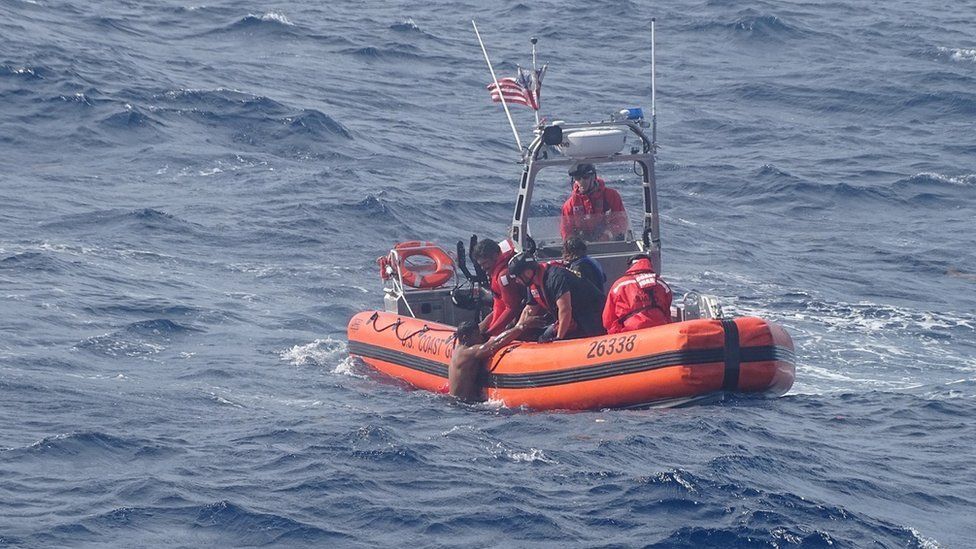ARTICLE AD BOX
 Image source, US Coast Guard
Image source, US Coast Guard
The US Coast Guard rescues a migrant in the Florida Straits
They were telling stories, laughing. They had set course for the United States from Havana at 03:00 on 16 November 2022. By dawn they were 30 miles off the Cuban coast.
The eight-passenger fishing boat was overloaded: 20 people were on board, among them four children under the age of seven and two teenagers.
Despite the weight, the boat was moving fast. But as the wind picked up, it started to take on water.
"It was a matter of seconds. A wrong turn of the helm, with a wave coming from the front. It came over the bow of the boat, sinking it instantly," says Alexander, one of only two survivors.
"At the speed it was going, it went down like a torpedo. There was no time for anything."
Alexander was sitting in the stern and managed to jump off just before it sank.
He saw the boat disappear into the darkness of the ocean. The waters of the Florida Straits are more than a mile deep.
The adults surfaced, but the youngest children, who had been in the boat's cabin, never did.
Their mothers were screaming.
One boy was briefly kept afloat by a man who placed the child on his shoulders, "but it's impossible to stay afloat with a person on top of you", recalls Alexander.
Alexander had a compass and tried to encourage the adults - all of whom were trying to keep afloat in the Caribbean Sea - to swim in the direction of land. But those who had lost their children did not want to stray from the place where the boat had sunk. Eventually, the group separated.
By nightfall, Alexander had lost sight of the rest. Rather than continue swimming, he decided to let the current carry him, hoping that would give him a better chance of being found by a ship, which may also be following the current.
He was adrift for two days and two nights before he was rescued by Cuban migrants aboard another boat.
Yet this second heavily overloaded vessel would also sink just hours later.
This time, Alexander grabbed a plastic box to help him stay afloat.
"The waves were [high as] mountains," he recalls.
Overnight, he started hallucinating. Imagining he had reached an island, he let go of the box and almost drowned.
He had lost all hope of rescue when a merchant ship spotted him at around 10:00 the next morning and called the US Coast Guard.
He and eight other survivors from the second sunken boat were fished from the sea alive. Alexander, who is in his thirties, was so exhausted he was unable to walk or eat for days.
A deadly year
Alexander may have narrowly escaped death twice during his attempt to migrate, but data gathered by the Missing Migrants Project of the International Organization for Migration (IOM) suggests many more have not been so lucky.
According to their data, last year saw the second-highest number of migrant casualties globally and the highest in the Americas since records began in 2014. At least 1,400 people died migrating in the region in 2022.
The IOM warns that these figures represent only "a minimum estimate", and that the true number of fatalities is likely higher.
Drowning was by far the leading cause of death for migrants in 2022.
The precarious situation in their homeland often leads people to brave the deadly risks that migration entails.
"Politics and violence are often underneath their economically driven decision", says Andrew Selee, president of the Migration Policy Institute, a non-partisan think tank.
Most of those who died on migration routes in the Americas in 2022 were Cubans, followed by Mexicans and Venezuelans.
Worldwide, Afghanistan, Algeria and Myanmar were the main countries of origin for migrants who died. In almost half of all cases the nationality was unknown.
No change on the horizon
So far in 2023, more than 2,000 migrants have died from the start of the year to 14 June.
"People are going to move as long as there is inequality in the world," says Julia Black, a project officer at the IOM.
Most of the migrants head for countries they see as offering greater stability and economic opportunity.
But the journey is often fraught with danger.
"This year already we're documenting more deaths than ever in the Central Mediterranean, more than in 2016. If no action is taken with these number of deaths, I don't know what is going to spur action," says Ms Black.
Andrew Selee says that what is needed is "a combination of greater legal channels, humanitarian protection efforts closer to where people live, and enforcement measures at borders".
"If you don't create legal pathways, it becomes very hard to police the border, and irregular journeys become very dangerous, which is what we see in most of the world."
For migrants like Alexander, who says there is "nothing" holding him in Cuba, the drive to leave outweighs the risks even after his 60-hour ordeal at sea.
Additional reporting by Becky Dale.

 1 year ago
37
1 year ago
37








 English (US) ·
English (US) ·